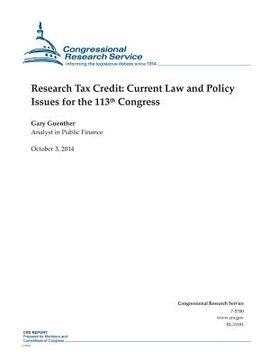Research Tax Credit: Current Law and Policy Issues for the 113th Congress (en Inglés)
Reseña del libro "Research Tax Credit: Current Law and Policy Issues for the 113th Congress (en Inglés)"
Technological innovation is a primary engine of long-term economic growth, and research and development (R&D) serves as the lifeblood of innovation. The federal government encourages businesses to invest more in R&D than they otherwise would in several ways, including a tax credit for increases in spending on qualified research above a base amount. This report describes the current status of the credit, summarizes its legislative history, discusses policy issues it raises, and describes legislation to modify and extend it. The report will be updated as warranted by legislative activity or other developments affecting the credit. The research credit (also known as the research and experimentation (R&E) tax credit) has never been permanent. It expired at the end of 2011 and was retroactively extended by the American Taxpayer Relief Act of 2012 (P.L. 112-240) through the end of 2013. Since its enactment in mid- 1981, the credit has been extended 15 times and significantly modified 5 times. While the credit is usually assumed to be a single credit, it actually consists of four discrete credits: (1) a regular credit, (2) an alternative simplified credit (ASC), (3) a basic research credit, and (4) an energy research credit. A taxpayer may claim one of the first two and each of the other two, provided it meets the requirements for each. In essence, the research credit attempts to boost business investment in basic and applied research by reducing the after-tax cost of undertaking qualified research above a base amount, which in theory approximates the amount a company would invest in R&D in the absence of the credit. As a result, the credit's effectiveness hinges on the sensitivity of the demand for this research to decreases in its cost. It is unclear from available studies how sensitive that demand actually is. While most analysts and lawmakers endorse the use of tax incentives to generate increases in business R&D investment, some have some reservations about the current credit. Critics contend that it is not as effective as it could or should be because of certain problems with its design. These include a lack of permanence, uneven and inadequate incentive effects, non-refundability, and an ambiguous definition of qualified research. The House has passed two bills (H.R. 4438, the American Research and Competitiveness Act of 2014 on May 9 and H.R. 4, the Jobs for America Act on September 18) that would simplify and permanently extend the research tax credit. Under each measure, the credit would be equal to the sum of 20% of a taxpayer's qualified research expenditures (QREs) in the current tax year above 50% of average annual QREs in the previous three tax years, 20% of its basic research payments in the current tax year above 50% of average annual basic research payments in the three previous tax years, and 20% of the amounts paid or incurred by the taxpayer in the current tax year for qualified energy research conducted by an energy research consortium. The bills' estimated 10-year revenue cost is $155.5 billion. On April 3, the Senate Finance Committee marked up S. 2260, the Expiring Provisions Improvement, Reform, and Efficiency Act. Among other things, the bill would extend the existing research credit through the end of 2015. It would also change its design by allowing small, young companies that are unable to use some or all of any credit they could claim for the current tax year because of insufficient tax liability to apply up to $250,000 of their credit against their federal payroll tax liabilities. This option would be available only to companies that have been in business fewer than five years and whose annual gross receipts are less than $5 million.

